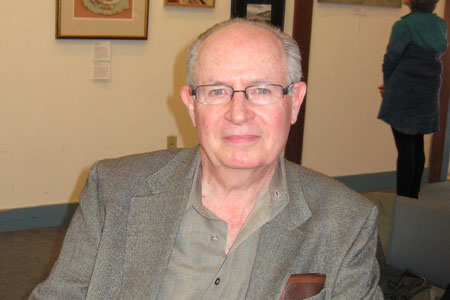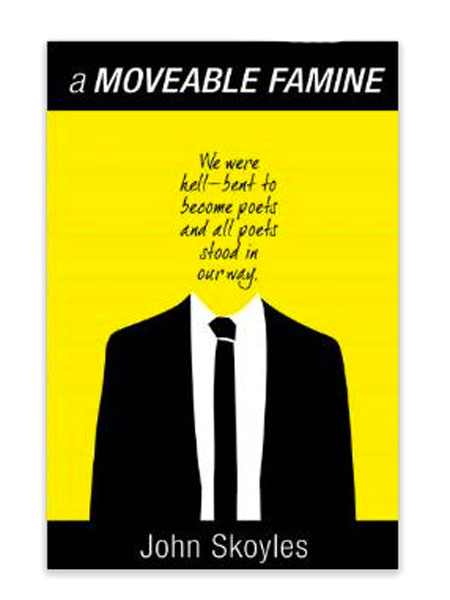Skoyles releases ’A Moveable Famine’

Professor John Skoyles, associate chair of the Writing, Literature, and Publishing Department, recently released A Moveable Famine (2014, Permanent Press).
Not quite fiction, not quite nonfiction is the way Professor John Skoyles describes his new coming-of-age book A Moveable Famine (2014, The Permanent Press), which traces Skoyles’ early days as a writer and artist who rubbed elbows with literary icons, such as Raymond Carver and Allen Ginsberg.
Skoyles’ unlikely obsession with poetry while growing up in working-class Queens led him from a Jesuit college’s “all male, sex-starved campus” to the St. Mark’s Poetry Project, and then to the Iowa Writers Workshop, according to a publisher’s description of the book. He makes up for his previous lack of romance while at the Fine Arts Work Center in Provincetown.
Dubbed by critics as an autobiographical novel, Skoyles said, “You could call this a fictional memoir, a nonfiction novel, a fictional autobiography, a fictional account of my real life, or an autobiography mostly true.”
The associate chair of Emerson’s Writing, Literature and Publishing Department, Skoyles is well known for authoring four books of poetry: A Little Faith, Permanent Change, Definition of the Soul, and The Situation. He has also published a collection of personal essays, Generous Strangers, and a memoir, Secret Frequencies: A New York Education.
“Emerson gave me a sabbatical leave for the writing of this book, which was immensely helpful,” Skoyles said.
A Moveable Famine has received positive reviews in recent weeks from the Boston Globe, Associated Press, and New York Journal of Books.

What is your reaction to the positive publicity?
Naturally, I’ve been pleased by the reviews. Most of them seem to have understood my sense of absurdity, which may sometimes go into the far reaches of the absurd, so I’m thankful for that. I like to make people laugh, and if I can make critics laugh, all the better.
Until now, most of your books were works of poetry. How and why did you decide to write an autobiographical novel?
Yes, poetry is my predominant field, but I have always written prose. I’ve published a book of personal essays and a memoir. This book came about because I wanted to record the things that happened to me in graduate school and beyond, yet I wanted to retain the pleasure of invention.
The book focuses on the literary and social landscape of the 1970s. Why is this era so important to the story?
It was a time when many social vectors intersected. The Vietnam War was winding down; feminism was establishing itself. Literary moments were in flux: Confessionalism was becoming passé, and many poets embraced a near-surrealism. This passage from the book will give you an idea of what it was like to be a student at that time: “The front window of Iowa Book & Supply displayed dozens of copies of Open Marriage: A New Lifestyle for Couples, a best seller disputing the virtues of fidelity. The showcase next to it contained Feminism: The Essential Historical Writings. This reflected the tone of what went on in the classroom and beyond.”
Why do you describe A Moveable Famine as a coming-of-age story?
Because it shows the narrator as a kid who graduates from a strict, cloistered college campus in Connecticut run by Jesuits, to attending a large Midwestern state school with the most competitive writing program in the country. And then to an artist community and his first teaching job, for which he is entirely unprepared. So the story shows the narrator’s growth socially and intellectually. And since it was not an upward trajectory, to put it mildly, the dips and impediments along the way make for comedy.
What about your book would resonate with college students?
In many ways, it’s an instruction manual of what not to do! But seriously, on a grand scale, things haven’t changed much. Everyone is seeking a partner. Everyone is seeking a mentor. The book contains a quest for both. It depicts love affairs thwarted or fulfilled. And it relates disappointment in various teachers, and true joy of finding guidance provided by those great, selfless souls who change lives. I was fortunate to meet several of them.
Do you expect your students to read A Moveable Famine?
I wouldn’t think of it. They have enough to read. I don’t recommend my work to my students. I do speak about my experiences as a writer when I teach. For example, while examining different strategies for writing first lines, I might mention mistakes I’ve made. But I make certain that they see their teacher as an example and not as a model.
Categories